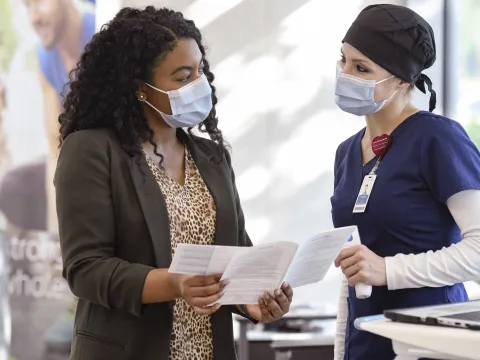- AdventHealth

With the spread of the coronavirus disease, it’s normal to have a lot of questions, especially about COVID-19 testing. We’re here to answer your questions about the testing process and procedures with the most up-to-date information from sources you can trust, like the Centers for Disease Control and Prevention (CDC) and the World Health Organization (WHO).
Please Note: Coronavirus Testing May Vary Nationwide
We’re sharing the most updated information available on coronavirus testing from the Centers for Disease Control and Prevention (CDC) and the Florida Department of Health — two reliable sources during this pandemic — but we understand that you may not live in the Sunshine State.
If you don’t live in Florida, a lot of the information below likely still applies to you as it comes from the CDC, which is a national organization. However, contact your state health department for specific questions about coronavirus testing in your area.
How Does COVID-19 Spread?
Similar to other infectious diseases, COVID-19 spreads mainly from person to person. If someone is infected with coronavirus, respiratory droplets from their sneezes or coughs can spread, making other people around them sick, too.
If an infected person is coughing or sneezing near you, you might get the virus from them. However, you might not get sick immediately. The incubation period for COVID-19 is about two to 14 days, according to the CDC. This means it can take anywhere from two to 14 days from the time you caught the virus for you to feel sick. This is known as being pre-symptomatic.
Additionally, some people are asymptomatic carriers — those who become infected with the virus but never have symptoms. Because of this, asymptomatic carriers can spread the virus without even knowing they have it.
How Can I Protect Myself From Getting Sick?
The best way to protect yourself is to assume that everyone you come in contact with could be a pre-symptomatic or asymptomatic carrier. Along with social distancing, it’s vitally important to practice good hygiene. The World Health Organization (WHO) recommends these protection measures for everyone:
- Practice respiratory hygiene when coughing or sneezing
- Stay at least 6 feet away from an infected person
- Use alcohol-based hand sanitizer when you can’t wash your hands
- Wash your hands with soap and water frequently
- Make sure everyone in your household brushes up on proper nose-blowing techniques
Who Gets Tested for Coronavirus?
According to the CDC, decisions about testing are made by state and local health departments or health care providers. In some instances, a provider’s order may not be required to get tested.
To be clear, if you’re tested, you’ll be tested for COVID-19, which is the disease caused by coronavirus.
Not everyone needs to be tested for COVID-19 (the disease caused by coronavirus) the CDC says, and some people are more at risk of severe illness than others. The CDC says that people who are most at risk of severe illness from the coronavirus disease include people who:
- Are age 65 or older
- Are immunocompromised, including from cancer treatment
- Are severely obese (body mass index at or over 40)
- Have pre-existing medical conditions
- Have diabetes, renal failure or liver disease
- Have heart conditions
- Have lung disease or asthma
- Live in a nursing home or long-term care facility
Read more about your risk of COVID-19 and what to know if you’re healthy.
In their coronavirus FAQs, the CDC says that your doctor will determine whether you should be tested. The Florida Department of Health says that your health care provider will work with your county health department to determine whether you need to be tested.
If you believe you're at risk for coronavirus (COVID-19), please contact your health care provider or the local Department of Health. Risk factors that may indicate coronavirus (COVID-19) include fever, cough, or flu-like signs, AND either recent international travel OR contact with someone recently diagnosed with coronavirus (COVID-19).
What COVID-19 Symptoms Should I Watch For?
Public health officials, the CDC and World Health Organization have all offered guidance on common coronavirus symptoms to watch for in yourself and the people you love. Specifically, you should be aware of these coronavirus symptoms:
- Fever
- Dry cough
- Shortness of breath
It’s easy to confuse these symptoms with those of the seasonal flu or even a cold. Learn the difference between the flu, cold and coronavirus to stay prepared. You should also be prepared and know what to do if you experience symptoms.
Who’s in Charge of COVID-19 Tests?
The CDC developed the laboratory test kit that’s used to identify coronavirus. The CDC has distributed test kits to U.S. state and local health laboratories in all 50 states, so there is most likely a laboratory in your area that is performing coronavirus tests.
For regularly updated information about COVID-19 testing in America, as well as public health laboratories performing the testing, visit this page from the CDC.
What Does the COVID-19 Test Look Like?
If you’ve had a flu test, you’ve likely had a nose and throat swab. The test for coronavirus is similar. Testing may involve taking a nasal and/or oral swab, or a saliva and/or sputum sample — kits aren’t all the same. You can see a picture of the test kit itself on the CDC’s website.
Where Can I Get Tested for COVID-19?
First, call or visit your primary care doctor virtually through the AdventHealth app to evaluate your symptoms. Before ordering a coronavirus test, your doctor may also evaluate you for the common cold, the flu, mono and other illnesses that have symptoms similar to this coronavirus disease.
Your doctor can then direct you on where to go for testing, if needed.
Be mindful of your contact with other people, friends and family members if you’re on your way to be tested for COVID-19 (remember to cover your coughs and sneezes and avoid handshakes) if there’s a chance you may test positive for coronavirus.
Who Shares COVID-19 Testing Results?
Once a coronavirus test is collected, the test results will be shared with the county health department.
What to Do if You Test Positive for COVID-19
If you’re tested for COVID-19 and you receive confirmation that you test positive, you should be instructed on what to do next by the physician or health officials who tested you. In most cases, people can self-quarantine themselves and heal from COVID-19 at home. If you live with family or roommates, take a look at this resource for practicing social distancing during quarantine when a member of the household has COVID-19.
You can also read up on the CDC’s guidance for what to do if you’re sick or caring for someone who is.
What to Do if You Test Negative for COVID-19
If you don’t test positive for COVID-19, you probably weren’t infected with coronavirus when your test was taken, the CDC says. It doesn’t mean that you won’t get sick from an infected person you come into contact with, though, so it’s important to stay home and stay safe as much as possible.
Stay home and follow the World Health Organization’s guidance on how to protect yourself, like washing your hands with soap and water, and keeping hand sanitizer handy in your home.
If you start to feel under the weather with a fever, cough and shortness of breath, don’t hesitate to call your doctor or video visit with them through the AdventHealth app. To schedule a video visit and more, get the AdventHealth app in the Google Play Store or the Apple App Store.
What to Do if Someone You Know Tests Positive for COVID-19
With the global spread of coronavirus, it’s possible that someone you know might get sick from it, like a relative, coworker, friend or even immediate family member. If you have at-risk loved ones, you can show them support during this time in several ways, all without leaving your house.
If you live with the person who’s sick, the CDC can guide you on how to care for them.
If you don’t live in the same house as the infected person, it’s best to support them from a distance. Check in on them through texting or calling, or even video chatting together. They’ll feel loved and supported through your check-ins, which can help them feel better mentally as they recover physically. For more ideas on how to be together while apart, read one of our most recent blogs about being social while distancing.
We’re Here for You at Every Stage of the Pandemic
As this health threat continues to evolve, we will continue to give you and your family timely advice about COVID-19 testing, with accurate information from the CDC, World Health Organization and other trustworthy sources.
We’re dedicated to not only relaying COVID-19 updates regularly, but also to giving your family the kind of news you can use to stay safe, healthy and well. Our blog is full of useful articles and coronavirus disease information that discusses:
- Groceries that will keep well in your pantry and refrigerator
- How to prepare for a pandemic effectively
- How to cope with stress, and help your kids cope, too
- How to keep kids learning at home
- Myths versus facts about coronavirus
- What new parents and pregnant moms should know
- What to do during a quarantine
- Why it’s so important to stay home
Find all of these topics, coronavirus FAQs, other articles like this one and more on our Coronavirus Resource Hub.


